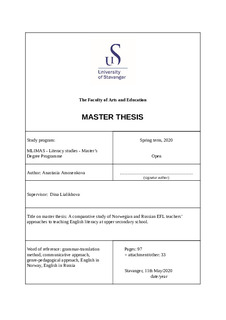| dc.description.abstract | Abstract
This study explores the ways Russian and Norwegian upper secondary EFL teachers approach teaching English language literacy. The main aim of the thesis is to investigate differences and similarities between teaching approaches applied to EFL literacy in upper secondary schools of Norway and Russia. The main research question is: ‘To what extent do approaches to teaching English language literacy at the upper secondary level in the Norwegian context differ from the Russian context?”
This field of research is young in both Norway and Russia, as there were presented no studies related to the same topic and context. Furthermore, the researcher, based on her own teaching experiences in the two contexts, have noticed that processes of globalisation have influenced the countries differently and a role of the English language is not the same. From this, it may seem that teaching literacy skills, which are among the most important, have been influenced, and revealing the tendencies of teaching them in different contexts can be the cornerstone of further research on the efficiency of applied approaches.
The present research is a qualitative study based on semi-structured in-depth interviews carried out among six EFL teachers working in upper secondary school, three in each context. The findings revealed that there could be traced both similarities and differences between the approaches to teaching EFL literacy in two different contexts. On the one hand, the Norwegian participants applied communicative process-oriented approach to teaching EFL writing, while the Russian participants tended to use the product-oriented grammar-translation method. The genre-pedagogical approach was common for both contexts.
The practice of teaching EFL reading was aimed at the development of intensive reading skills, work with different types of texts and involving pre-, while- and post-reading activities with implicit vocabulary learning. EFL literacy within the exam preparation was treated differently in Norway and Russia. While the Russian EFL teachers found significant teaching all the EFL literacy elements, the Norwegian participants had various opinions concerning the importance of developing reading or writing skills during the preparatory sessions. They demonstrate freedom to choose whether they put effort into writing or focus more on reading.
Despite the above-mentioned differences, both in Norway and Russia there were positive attitudes towards the implementation of digital tools into the EFL educational process, literacy teaching in particular. In addition to it, the interviews revealed that the projector was the most available educational tool in both contexts.
The results of this study imply that there still exist differences in teaching English literacy in the two countries with unsimilar relations and attitudes towards the English language. This study is among few comparative studies about teaching practice in Norway and Russia. It contributes to the field of linguistics and is the unique work, which provides an in-depth overview of the way upper secondary teachers approach teaching EFL literacy in different countries, particularly: Norway and Russia. This thesis can be a basis for further ideas and studies, for instance, a research in the ways Norwegian and Russian teachers approach teaching EFL oral skills. This master thesis cannot be claimed as the absolutely solid axiom. Readers can both agree and disagree with its results, but in spite of that, this thesis is a move towards studying and comparing English language teaching approaches in Norway and Russia. | en_US |
